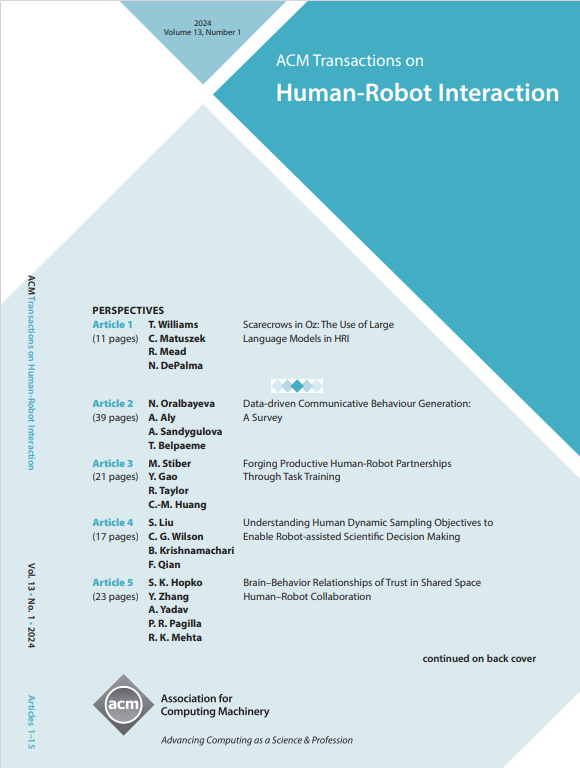Towards an Integrative Framework for Robot Personality Research
IF 5.5
Q2 ROBOTICS
引用次数: 0
Abstract
Within human-robot interaction (HRI), research on robot personality has largely drawn on trait theories and models, such as the Big Five and OCEAN. We argue that reliance on trait models in HRI has led to a limited understanding of robot personality as a question of stable traits that can be designed into a robot plus how humans with certain traits respond to particular robots. However, trait-based approaches exist alongside other ways of understanding personality including approaches focusing on more dynamic constructs such as adaptations and narratives. We suggest that a deep understanding of robot personality is only possible through a cross-disciplinary effort to integrate these different approaches. We propose an Integrative Framework for Robot Personality Research (IF), wherein robot personality is defined not as a property of the robot, nor of the human perceiving the robot, but as a complex assemblage of components at the intersection of robot design and human factors. With the IF, we aim to establish a common theoretical grounding for robot personality research that incorporates personality constructs beyond traits and treats these constructs as complementary and fundamentally interdependent.构建机器人人格研究的综合框架
在人机交互(HRI)领域,有关机器人个性的研究主要借鉴了特质理论和模型,如 "五大特质 "和 "OCEAN"。我们认为,在人机交互领域,对特质模型的依赖导致了对机器人个性的有限理解,即机器人是否具有稳定的特质,以及具有特定特质的人类如何对特定机器人做出反应。然而,基于特质的方法与其他理解个性的方法并存,其中包括关注适应性和叙事等更具动态性的结构的方法。我们认为,只有通过跨学科的努力来整合这些不同的方法,才有可能深入理解机器人的个性。我们提出了 "机器人个性研究综合框架"(IF),其中机器人个性既不是机器人的属性,也不是人类感知机器人的属性,而是机器人设计和人类因素交叉点上的复杂组合。通过 IF,我们旨在为机器人个性研究建立一个共同的理论基础,将个性构造纳入特质之外,并将这些构造视为互补的、从根本上相互依存的。
本文章由计算机程序翻译,如有差异,请以英文原文为准。
求助全文
约1分钟内获得全文
求助全文
来源期刊

ACM Transactions on Human-Robot Interaction
Computer Science-Artificial Intelligence
CiteScore
7.70
自引率
5.90%
发文量
65
期刊介绍:
ACM Transactions on Human-Robot Interaction (THRI) is a prestigious Gold Open Access journal that aspires to lead the field of human-robot interaction as a top-tier, peer-reviewed, interdisciplinary publication. The journal prioritizes articles that significantly contribute to the current state of the art, enhance overall knowledge, have a broad appeal, and are accessible to a diverse audience. Submissions are expected to meet a high scholarly standard, and authors are encouraged to ensure their research is well-presented, advancing the understanding of human-robot interaction, adding cutting-edge or general insights to the field, or challenging current perspectives in this research domain.
THRI warmly invites well-crafted paper submissions from a variety of disciplines, encompassing robotics, computer science, engineering, design, and the behavioral and social sciences. The scholarly articles published in THRI may cover a range of topics such as the nature of human interactions with robots and robotic technologies, methods to enhance or enable novel forms of interaction, and the societal or organizational impacts of these interactions. The editorial team is also keen on receiving proposals for special issues that focus on specific technical challenges or that apply human-robot interaction research to further areas like social computing, consumer behavior, health, and education.
 求助内容:
求助内容: 应助结果提醒方式:
应助结果提醒方式:


